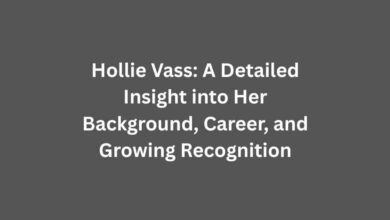Emma Nagouse: The Fearless Voice Bridging Feminism, Faith, and Modern Culture

Emma Nagouse is a name that resonates with power, intellect, and purpose. A British broadcaster, writer, researcher, and academic, she has steadily built a reputation as one of the most compelling voices in conversations about gender, religion, and social justice. Known for her articulate insights and fearless approach to sensitive topics, Emma represents a new generation of scholars who are breaking barriers between academia and public discourse. Her work brings feminist thought, religious analysis, and popular culture into a meaningful and accessible dialogue that speaks to modern audiences.
Early Life and Academic Foundations
Emma Nagouse’s intellectual curiosity began long before her academic career took shape. Based in South Tyneside, she grew up with a keen awareness of the social structures that define everyday life—gender, class, and religion. Her fascination with how narratives are told, particularly through faith and culture, guided her towards the academic world.
She pursued her higher studies with a focus on the intersection between theology, gender, and social justice. Her academic path eventually led her to the University of Sheffield, where she became affiliated with the Sheffield Institute for Interdisciplinary Biblical Studies (SIIBS). There, she embarked on her PhD research—an ambitious and deeply important exploration of rape culture in religion and society.
Research on Religion and Rape Culture
Emma’s doctoral research delved into how religious texts and traditions have historically shaped attitudes towards gender and violence. By analysing the stories, symbolism, and rhetoric within biblical narratives, she uncovered how patriarchal interpretations have often normalised or minimised acts of violence against women. Her work does not merely criticise religious institutions but examines how reinterpretation and awareness can promote justice and healing.
Her academic voice emerged as part of a wider movement challenging long-standing silences around sexual violence in sacred texts. Emma’s approach was never simply academic—it was ethical, activist, and empathetic. She sought to empower survivors and provoke conversations about accountability in religious communities. Her writings within this field have become part of a growing scholarly movement that integrates feminist ethics with theology, making her a respected figure in contemporary religious studies.
Feminist Activism and Public Engagement
While her research has academic depth, Emma Nagouse is equally recognised for her ability to communicate these ideas to a broader audience. She is an outspoken feminist and a strong advocate for equality and inclusion. Her work often focuses on how societal narratives shape perceptions of gender and power, and she uses her platform to challenge stereotypes with intelligence and wit.
Emma’s participation in projects like the Feminist Oral History Archive in Sheffield reflects her dedication to preserving women’s voices and experiences. Through this initiative, she helped document stories of feminist activism across generations, ensuring that the struggles and triumphs of women’s movements remain part of the public record.
Her contributions to platforms like The Shiloh Project—a collective of scholars focusing on religion and rape culture—further demonstrate her commitment to feminist ethics. She combines academic rigour with compassion, ensuring that survivors’ experiences remain central to the conversation rather than lost in theoretical abstraction.
Transition to Broadcasting and Media
One of the most remarkable aspects of Emma Nagouse’s career is her seamless transition from academia to media. She has proven that rigorous scholarship and mainstream communication can go hand in hand. As a senior producer for the BBC, she played a key role in the success of You’re Dead To Me, a history podcast that combines humour, storytelling, and education. The show, hosted by Greg Jenner, became one of the BBC’s most successful productions, with over 100 million global downloads.
Emma’s ability to blend factual storytelling with entertainment helped shape the tone and depth of You’re Dead To Me, making history relatable and engaging to all audiences. She also contributed to Homeschool History, another BBC Radio 4 programme that educates younger listeners in a lively, accessible way.
Her experience in broadcasting highlights her rare talent: bringing complex academic ideas into popular formats without diluting their meaning. Through these projects, she has helped redefine how education and entertainment can coexist in modern media.
MUSES: A Podcast Bridging Art and Emotion
Emma Nagouse’s creative pursuits extend beyond traditional broadcasting. She co-created and co-hosted MUSES: An Ampersand Podcast with Dan Smith, the lead singer of the band Bastille. This podcast explores the relationships between artists and their inspirations—those who have served as their “muses.”
Through thoughtful storytelling and emotional honesty, MUSES examines how love, admiration, and creativity intertwine. Emma’s background in cultural studies and gender theory enriches the discussions, giving the show a unique intellectual edge. The podcast has been praised for its emotional depth, diversity of subjects, and human-centred approach.
Bridging Academia and Popular Culture
Emma Nagouse represents a new kind of public intellectual—one who refuses to stay confined within the walls of academia. Her work demonstrates that research does not need to be detached from lived experience or popular expression. Instead, it can thrive in conversation with music, television, social media, and community activism.
Her voice has become essential in bridging the gap between scholarly insight and cultural dialogue. By discussing religion, feminism, and power dynamics through accessible platforms, Emma encourages audiences to think critically about the stories that shape our understanding of the world.
Writing and Creative Expression
In addition to her broadcasting work, Emma Nagouse is a gifted writer. Her essays, reflections, and commentaries focus on themes such as faith, gender, violence, and social reform. She uses her writing not only to educate but also to inspire empathy. Each piece reflects her commitment to storytelling as a force for good—turning academic theory into human narrative.
Her written work often blends academic insight with lyrical prose, exploring how personal experiences intersect with collective histories. Whether writing about the portrayal of women in sacred texts or the influence of pop culture on social values, Emma’s writing is known for its clarity, compassion, and conviction.
Advocacy for Gender Equality and Inclusion
Emma Nagouse continues to use her influence to advocate for a more inclusive society. She speaks openly about the need for equal representation in education, media, and leadership. Her work challenges the structures that perpetuate inequality, urging both men and women to question cultural assumptions about gender and power.
She has also been a consistent supporter of survivors of gender-based violence, highlighting the importance of trauma-informed approaches in both religious and secular settings. Her advocacy extends beyond words—she works within communities to foster dialogue, understanding, and solidarity.
Legacy and Ongoing Impact
Emma Nagouse’s impact extends across multiple disciplines—religious studies, gender theory, media, and activism. She has shown that scholarship can have heart, and that media can carry intellectual weight. Her influence reaches young academics who seek to connect research with public engagement, as well as listeners who find comfort and empowerment in her storytelling.
Through her continued projects with the BBC and independent media, Emma remains a prominent figure shaping Britain’s cultural and intellectual landscape. Her journey demonstrates how courage, intellect, and compassion can reshape public understanding of some of the most difficult issues facing society today.
Conclusion
Emma Nagouse stands at the intersection of thought and action, academia and art, empathy and intellect. She represents a generation of thinkers determined to make knowledge accessible, engaging, and transformative. Her work has challenged traditional power structures, opened new pathways for understanding gender and faith, and inspired countless people to think differently about the world around them.
In an age where information moves fast but reflection is rare, Emma’s thoughtful voice reminds us of the importance of listening—to stories, to history, and to one another. Whether through her academic research, feminist activism, or groundbreaking podcasts, she continues to prove that ideas can change lives when delivered with authenticity and courage. Emma Nagouse is not just an academic or a broadcaster—she is a movement of empathy, intellect, and transformation wrapped into one powerful human voice.



